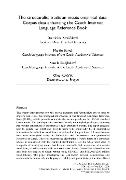The Structuralist Tradition Meets Empirical Data: Corpus Data Enhancing the Czech Internet Language Reference Book

Publication date
2023Published in
Word StructureVolume / Issue
16 (2-3)ISBN / ISSN
ISSN: 1750-1245ISBN / ISSN
eISSN: 1755-2036Funding Information
UK/COOP/COOP
AHRC/AHRC/AH/T002859/1
MSM/LM/LM2023044
Metadata
Show full item recordCollections
This publication has a published version with DOI 10.3366/word.2023.0230
Abstract
This paper demonstrates how the corpus grammar tool GramatiKat can be used to improve and refine morphological information in the Internet Language Reference Book (ILRB), which presents complete declension paradigms for 45,632 standard Czech nouns. The paradigm tables are based mainly on morphological types, following structuralist conceptions of language as a fully articulated system. The paper discusses how to update the ILRB and provide users with empirically based grammatical information for individual word forms in each cell of the paradigm. All noun lemmas have been investigated using the GramatiKat tool for research into grammatical categories in Czech. The tool observes the distribution of word forms of a particular lexeme in comparison with the standard distribution across the whole word class. It is capable of identifying nouns that have an unusually high occurrence of a certain word form, as well as nouns with unattested word forms. GramatiKat is based on the data from two corpora of Czech written texts, SYN2015 and SYN2020 (200 million word tokens). The paper investigates the relationship between defectiveness and overabundance on one side and language variability and potentiality on the other. Based on the unique combination of data from the ILRB and GramatiKat, the paper suggests how information about unusually frequent or overabundant word forms as well as unattested ones should be pointed out, so that ILRB provides the user with accurate, empirically based data.
Keywords
Czech, codification, corpora, declension paradigm, defectiveness, GramatiKat, Internet Language Reference Book, overabundance, usage, word form variants
Permanent link
https://hdl.handle.net/20.500.14178/2878License
Full text of this result is licensed under: Creative Commons Uveďte původ 4.0 International




